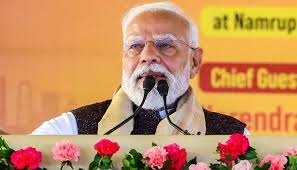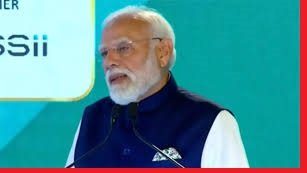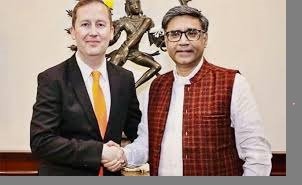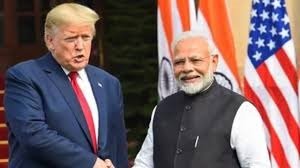Reuters claims drop in Russian crude imports, while Indian authorities insist decisions are based on economic factors, not political pressure
Washington / New Delhi | Economy India: Former U.S. President Donald Trump made a striking remark on Friday, suggesting that India may soon stop buying crude oil from Russia. His statement comes amid conflicting media reports and growing speculation over India’s continued trade relations with Moscow despite Western sanctions.
Speaking to reporters outside the White House, Trump said, “I’ve heard India might soon stop buying oil from Russia. I don’t know if that’s true, but if it is, that’s a good thing. We’ll see what happens.”
His comment followed a Reuters report earlier this week that claimed Indian refiners had significantly scaled back Russian oil imports, citing narrowing discounts and increased logistical hurdles. However, Indian officials swiftly dismissed the claim, asserting that Indian companies continue to import Russian oil and that such decisions are guided solely by commercial factors.
🔍 Reuters vs ANI: A Tale of Two Reports
➤ Reuters’ Claim (July 30 Report):
Reuters reported that major Indian oil firms — Indian Oil Corporation, Hindustan Petroleum, and Bharat Petroleum — have paused Russian oil purchases due to:
- Diminishing price discounts
- Rising shipping complexities
- Fear of new sanctions from the European Union
The report highlighted that no new purchases were made in the past week and that Russia’s price advantage had fallen to its lowest since 2022.
Furthermore, the report suggested that refiners feared new EU sanctions (effective from July 18) might complicate foreign trade and banking for Russian oil transactions.
➤ ANI & Indian Officials Respond:
In response, an ANI report citing Indian government sources strongly refuted Reuters’ claims, stating that “Indian companies are still purchasing Russian oil.”
A senior official from the Ministry of External Affairs (MEA) told ANI, “Our crude procurement strategy is based on economic factors—such as pricing, quality, logistics, inventory status, and commercial needs—not political pressure.”
Officials emphasized:
- Russia is the world’s second-largest oil producer, accounting for nearly 10% of global supply.
- India is the third-largest energy consumer, importing around 85% of its crude oil requirements.
- Procurement from Russia is part of a diversified, strategic sourcing policy that aligns with global norms and energy security needs.

🔒 No International Ban on Russian Oil Purchases
Indian officials clarified that no international law prohibits Russian oil purchases.
However:
- The G7 and European Union have imposed a price cap mechanism on Russian oil.
- India has consistently respected this framework, ensuring all imports are compliant with global rules.
One MEA source added, “If India hadn’t bought discounted oil from Russia during OPEC+ production cuts, global crude prices would’ve surged further, inflating costs worldwide.”
India’s role, the official noted, helped stabilize global energy markets and prevent wider inflationary shocks.
🌍 Geopolitical Context: Strategic Autonomy at Play
India has long advocated a policy of “strategic autonomy” in foreign policy, particularly in its approach to energy security. Despite Western pressure, India has maintained energy ties with Russia since the Ukraine conflict began, arguing that national interest must prevail over bloc politics.
This recent episode underscores the delicate balance India seeks to strike between Western partnerships and its energy-driven engagement with Russia.
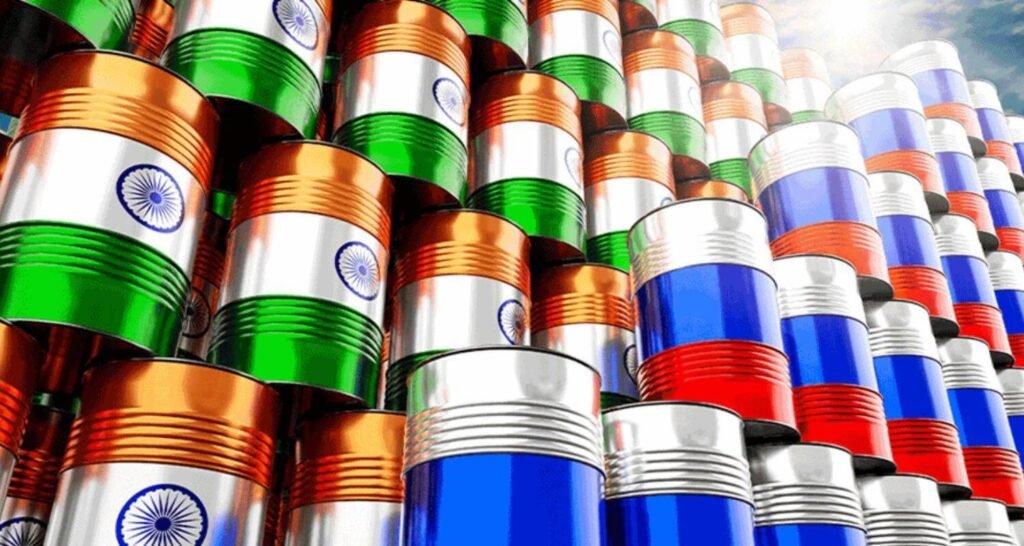
📊 Russia’s Share in India’s Oil Imports (Past 12 Months)
| Month | Russian Oil Share (%) | Avg. Crude Discount (USD/barrel) |
|---|---|---|
| Aug 2024 | 28% | $13.5 |
| Nov 2024 | 24% | $10.8 |
| Feb 2025 | 19% | $8.2 |
| July 2025 | ~14% (estimated) | $5.6 |
Source: Industry estimates; figures reflect decline in purchases and shrinking discounts.
🛢️ India’s Energy Imperative: Cost vs. Compliance
As international oil markets remain volatile due to geopolitical conflicts, India continues to prioritize affordability and reliability in sourcing crude oil.
Government officials stress that energy security is a non-negotiable priority, and pricing remains the top criterion in selecting suppliers.
“In a world of rising geopolitical uncertainty, India will not compromise on energy affordability for its 1.4 billion citizens,” a senior MEA official stated.
As media narratives diverge over India’s Russia oil trade, former U.S. President Trump’s remark has added fresh fuel to the geopolitical fire. While Reuters claims India is cutting back on Russian crude, Indian authorities insist that purchases continue based on commercial logic, not diplomatic coercion.
The coming weeks will reveal whether India’s strategy of balancing Western expectations and Eastern energy partnerships holds steady amid mounting global scrutiny.
(Economy India)






